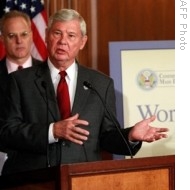voa标准英语2008-US Commission Warns of Possible WMD Attack
搜索关注在线英语听力室公众号:tingroom,领取免费英语资料大礼包。
(单词翻译)
A congressionally-mandated U.S. commission has released a report warning of a possible nuclear or biological attack somewhere in the world within five years. The report singles out Pakistan as the top security priority for the United States. VOA's Deborah Tate reports from Capitol Hill. |
| Commission Chairman former Sen. Bob Graham speaks during a press conference on a new report on 'Preventing Nuclear and Biological Terrorism Threats' in Washington, 03 Dec 2008 |
The chairman of the bipartisan Commission on the Prevention of Weapons of Mass Destruction Proliferation and Terrorism, former U.S. Senator Bob Graham, presented the panel's sobering conclusions at a Capitol Hill news conference on Wednesday.
"It is more likely than not that a weapon of mass destruction will be used somewhere in the world prior to the end of 2013," he said. "We also found that it was more likely that that weapon would be biological than nuclear."
In its report, called "World at Risk," the commission cites Pakistan as the top security priority for the incoming Obama administration.
Although the report notes that Pakistan is a U.S. ally, it says the next terrorist attack against the United States could originate from within the country's Federally Administered Tribal1 Areas. The United States says the tribal areas in northwest Pakistan, where the Islamabad government exerts little control, are a haven2 for militants3 from both Pakistan and neighboring Afghanistan.
Members of the commission were served a reminder4 of the urgency of their mission when a bomb blast destroyed the Islamabad Marriott Hotel as they were en route to the Pakistani capital in September.
Former U.S. Representative Tim Roemer also served on the commission.
"We were hours away from the Marriott Hotel in Islamabad when the terrorists hit it," said Tim Roemer. "That was a near miss for this commission and for its members, but certainly a signal that Pakistan, when you're looking at the confluence5 of terrorism and proliferation, all roads lead to Pakistan."
The commission calls on the United States to work with Pakistan and other countries in the region to eliminate terrorist safe havens6 through military, economic and diplomatic means, secure nuclear and biological materials in Pakistan, counter and defeat extremist ideology7, and constrain8 a nascent9 nuclear arms race in Asia.
The commission also urges the incoming Obama administration to take steps to prevent Iran and North Korea from possessing uranium enrichment or plutonium reprocessing capabilities10.
Commission Chairman, Bob Graham:
"We are recommending the new administration give these two issues the priority they deserve, that they negotiate," he said. "And we suggest that that might be through direct engagement negotiation11 in both countries with appropriate incentives12 and disincentives, but with the understanding that we are not taking from our range of options the use of direct force if other means are unsuccessful."
At the White House, spokeswoman Dana Perino said the outgoing Bush administration has fought the proliferation of weapons of mass destruction.
"We recognize that there is more to do," said Dana Perino. "But what we have done has provided a really good foundation for the next team to be able to take that on and to try to continue to keep us safe."
The commission's other recommendations include calling an international conference of countries with major biotechnology industries to promote biosecurity, strengthen global disease surveillance networks and press for universal adherence13 to the Biological Weapons Convention.
Former U.S. Senator Jim Talent, Vice14 Chairman of the commission, said there are two ways terrorists could get hold of biological weapons.
"The terrorists could acquire the biological capabilities or they could convince biological scientists to become terrorists and get the capability15 right away," he said.
The commission calls on the U.S. government to set strong penalties for violators who withdraw from the Nuclear Non-Proliferation Treaty and strengthen the International Atomic Energy Agency. It also calls for employing further counter-proliferation efforts and working with Russia to secure its nuclear materials.
The commission report is the result of a six-month study and testimony16 from more than 250 experts from around the world.
 收听单词发音
收听单词发音 




